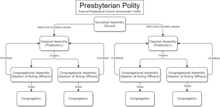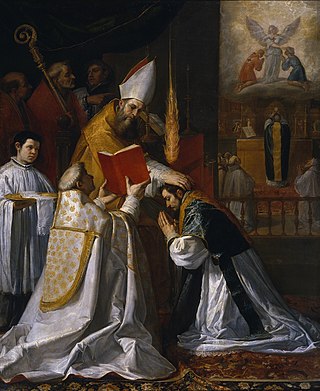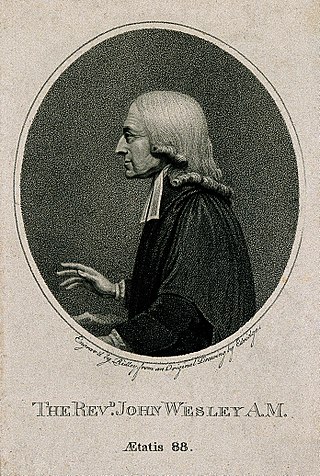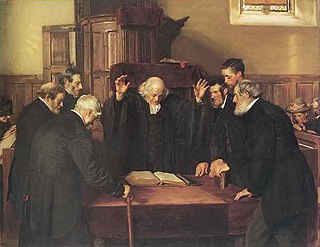
The Form of Presbyterial Church Government is a document drawn up by the Westminster Assembly dealing with Presbyterian polity. It forms part of the Westminster Standards, and was adopted by the Church of Scotland in 1645.

The Form of Presbyterial Church Government is a document drawn up by the Westminster Assembly dealing with Presbyterian polity. It forms part of the Westminster Standards, and was adopted by the Church of Scotland in 1645.
The Form of Presbyterial Church Government describes four church officers: pastors, teachers/doctors, elders, and deacons.
The pastor is a "minister of the gospel", while the doctor is a minister who "doth more excel in exposition of scripture, in teaching sound doctrine and convincing gainsayers than he doth in application". The doctors are thus essentially theological professors, "of most excellent use in schools and universities".
The elder is distinguished from the minister, and has the role of church governance, while the deacon is "to take special care in distributing to the necessities of the poor."

The Form of Presbyterial Church Government describes how the Church should be divided up in congregations, ordinarily "by the respective bounds of their dwellings". There ought to be at least one minister per congregation, along with others to govern. These people are to meet regularly, with the minister acting as the "moderator" of the meeting. The document calls this a "congregational assembly".
The Form also argues for a body called the "presbytery" or "classical assembly". It is to consist of ministers and elders, and is to have oversight of a number of congregations.
The third type of assembly is the "synodical assembly", which is above the level of the presbytery.
The final section describes how ministers are to be ordained by the presbytery. It sets the minimum age for ministers at twenty-four, and includes a comprehensive list of points on which a candidate is to be examined.

In certain Christian denominations, holy orders are the ordained ministries of bishop, priest (presbyter), and deacon, and the sacrament or rite by which candidates are ordained to those orders. Churches recognizing these orders include the Catholic Church, the Eastern Orthodox, Oriental Orthodox, Anglican, Assyrian, Old Catholic, Independent Catholic and some Lutheran churches. Except for Lutherans and some Anglicans, these churches regard ordination as a sacrament.

Presbyterianism is a Reformed (Calvinist) Protestant tradition named for its form of church government by representative assemblies of elders. Though there are other Reformed churches that are structurally similar, the word Presbyterian is applied to churches that trace their roots to the Church of Scotland or to English Dissenter groups that formed during the English Civil War.

The Presbyterian Church (USA), abbreviated PC (USA), is a mainline Protestant denomination in the United States. It is the largest Presbyterian denomination in the country, known for its liberal stance on doctrine and its ordaining of women and members of the LGBT community as elders and ministers. The Presbyterian Church (USA) was established with the 1983 merger of the Presbyterian Church in the United States, whose churches were located in the Southern and border states, with the United Presbyterian Church in the United States of America, whose congregations could be found in every state.
Presbyterianpolity is a method of church governance typified by the rule of assemblies of presbyters, or elders. Each local church is governed by a body of elected elders usually called the session or consistory, though other terms, such as church board, may apply. Groups of local churches are governed by a higher assembly of elders known as the presbytery or classis; presbyteries can be grouped into a synod, and presbyteries and synods nationwide often join together in a general assembly. Responsibility for conduct of church services is reserved to an ordained minister or pastor known as a teaching elder, or a minister of the word and sacrament.
Presbyter is an honorific title for Christian clergy. The word derives from the Greek presbyteros, which means elder or senior, although many in Christian antiquity understood presbyteros to refer to the bishop functioning as overseer. The word presbyter is used many times in the New Testament, referring both to the Jewish leadership and the "tradition of the elders", and to the leaders of the early Christian community.

The Reverend is an honorific style given before the names of certain Christian clergy and ministers. There are sometimes differences in the way the style is used in different countries and church traditions. The Reverend is correctly called a style, but is sometimes referred to as a title, form of address, or title of respect. The style is also sometimes used by leaders in other religions such as Judaism and Buddhism.
A pastor is the leader of a Christian congregation who also gives advice and counsel to people from the community or congregation. In Lutheranism, Catholicism, Eastern Orthodoxy, Oriental Orthodoxy and Anglicanism, pastors are always ordained. In Methodism, pastors may be either licensed or ordained.

The Presbyterian Church in America (PCA) is the second-largest Presbyterian church body, behind the Presbyterian Church (USA), and the largest conservative Calvinist denomination in the United States. The PCA is Reformed in theology and presbyterian in government.

In Christianity, a minister is a person authorised by a church or other religious organization to perform functions such as teaching of beliefs; leading services such as weddings, baptisms or funerals; or otherwise providing spiritual guidance to the community. The term is taken from Latin minister. In some church traditions the term is usually used for people who have been ordained, but in other traditions it can also be used for non-ordained.

The Evangelical Presbyterian Church (EPC) is an American church body holding to presbyterian governance and Reformed theology. It is a conservative Calvinist denomination. It is most distinctive for its approach to the way it balances certain liberties across congregations on "non-essential" doctrines, such as egalitarianism in marriage or the ordination of women, alongside an affirmation of core "essential" doctrinal standards.

The Presbyterian Church in Canada is a Presbyterian denomination, serving in Canada under this name since 1875. The United Church of Canada claimed the right to the name from 1925 to 1939. According to the Canada 2021 Census 301,400 Canadians identify themselves as Presbyterian, that is, 0.8 percent of the population.

The Presbyterian Church in the United States of America (PCUSA) was a Presbyterian denomination existing from 1789 to 1958. In that year, the PCUSA merged with the United Presbyterian Church of North America. The new church was named the United Presbyterian Church in the United States of America. It was a predecessor to the contemporary Presbyterian Church (USA).

There have not been bishops in the Church of Scotland since the Restoration Episcopacy of the 17th century, although there have occasionally been attempts to reintroduce episcopalianism.

A Church of Scotland congregation is led by its minister and elders. Both of these terms are also used in other Christian denominations: see Minister (Christianity) and Elder (Christianity). This article discusses the specific understanding of their roles and functions in the Scottish Church.

Ecclesiastical polity is the government of a church. There are local (congregational) forms of organization as well as denominational. A church's polity may describe its ministerial offices or an authority structure between churches. Polity relates closely to ecclesiology, the theological study of the church.
In Christianity, an elder is a person who is valued for wisdom and holds a position of responsibility and authority in a Christian group. In some Christian traditions an elder is an ordained person who serves a local church or churches and who has been ordained to a ministry of word, sacrament and order, filling the preaching and pastoral offices. In other Christian traditions, an elder may be a lay person serving as an administrator in a local congregation, or be ordained and serving in preaching or pastoral roles. There is a distinction between ordained elders and lay elders. The two concepts may be conflated in everyday conversation. In non-Christian world cultures the term elder refers to age and experience, and the Christian sense of elder is partly related to this.
Attitudes in Presbyterianism toward homosexuality vary, ranging from outright condemnation to complete acceptance.

The Indonesian Christian Church Synod is an Indonesian church of Presbyterian denomination. It adheres to Calvinist theology.

The Reformed Presbyterian Church of North America (RPCNA) is a Presbyterian church with congregations and missions throughout the United States, Canada, Japan, and Chile. Its beliefs—held in common with other members of the Reformed Presbyterian Global Alliance—place it in the conservative wing of the Reformed family of Protestant churches. Below the Bible—which is held as divinely inspired and without error—the church is committed to several "subordinate standards," together considered with its constitution: the Westminster Confession of Faith and Larger and Shorter Catechisms, along with its Testimony, Directory for Church Government, the Book of Discipline, and Directory for Worship.

The Reformed Presbyterian Global Alliance is a communion of Presbyterians originating in Scotland in 1690 when its members refused to conform to the establishment of the Church of Scotland. The Reformed Presbyterian churches collectively have approximately 9,500 members worldwide in Northern Ireland, the Republic of Ireland, Scotland, France, the United States of America, Canada, Japan, South Sudan, and Australia.